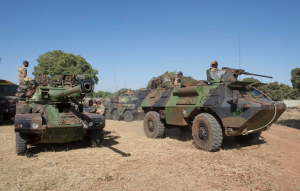2013-01-27 According to a recent interview with a senior French military officer, the role of coalitions in shaping an effective approach was discussed.
In the interview, the officer argued that an efficient command structure with a clear approach to engagement termination was central.
He argued that NATO or EU command structures worsened the situation in both ways.
First, an effective command structure was made very difficult. And the ability to transition out was mudded. What was clearly needed was an effective knock out punch in North Mali followed by a takeover by African forces.
The interview appeared in the EUobservor and excerpts follow:
Colonel Michel Goya, a serving officer and an expert at the l’Institut de Recherche Strategique de l’Ecole Militaire in Paris, told EUobserver in an interview on Thursday (24 January): “We have more freedom of action if we do it alone than if we go through Nato procedures. It would be even worse at EU level. If we do it alone, it’s more efficient in military terms.”
He said Nato operations run into problems because some countries take a back seat.
“In Afghanistan, you have some countries who really fight and others who do very little. For example, the German contingent and the Italian contingent don’t have a combat role. There are many countries who do not want to fight, so working in the coalition is very tough,” he noted.

“In Libya, we were less efficient because we used Nato command structures … If you have to react quickly to events, it’s better to do it at a national or bi-national level,” he said.
He was even more critical of EU “battlegroups.”
France, Germany and Poland on 1 January activated the Weimar Battlegroup – a joint force of 1,700 men which can, on paper, be sent to a hotspot five to 10 days after the decision is made.
“The EU doesn’t know how to wage war. It’s not prepared to launch military operations of this type [Mali],” Goya said.
“Battlegroups are fine if there is no combat. If we had to fight, we would probably see very few Germans and Poles in the field,” he added…..
Goya said there is a clear command structure (in the current operation).
General Didier Castres, based in Paris, is in overall command of all the activities.
Another French general, Bernard Barrera, based in Bamako, is in charge of operations on the ground.
He said France does not need anybody’s help to “reconquer” north Malian towns from the jihadist groups.
But he said French soldiers should pull back when this is done and let African soldiers – especially desert specialists from Chad – take the lead in the long-term campaign to drive jihadists out of the region’s vast deserts.
“France has to know when to stop and what to be content with in order to win,” Goya noted.
“If we stay and fight in the desert then we will probably suffer losses and we will risk losing public support in France … We will also risk the Afghanistan phenomenon of being seen as a foreign occupation force, provoking anti-French Malian nationalism,” he added.
He said the EU training force would come in useful in the African-led phase of the campaign.
He also said Europe will need to donate or sell armored vehicles and combat helicopters to the African soldiers.
http://euobserver.com/defence/118858
Editor’s Comment: We have published two related pieces.
The first deals with the French Mali-led operation.
https://sldinfo.com/the-french-serval-operation-the-double-edged-sword-of-the-mali-operation/
The second deals with AFRICOM’s request for payment by France for logistical support.
http://www.sldforum.com/2013/01/re-building-us-strategy-missing-the-point-of-allies/

